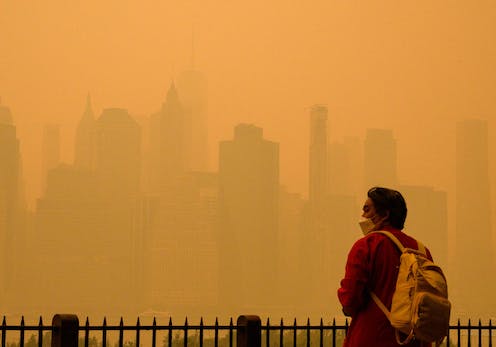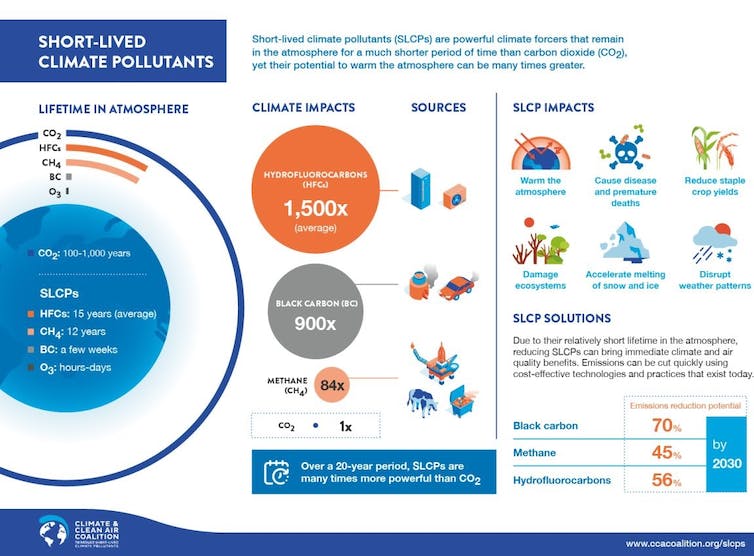
As the eastern U.S. and Canada reeled from days of thick wildfire smoke in early June 2023, millions of people faced the reality of climate change for the first time. Shocking images of New York under apocalyptic orange skies left many people glued to air quality indices and wondering whether it was safe to go outside.
What they might not realize is that the air many of them breathe isn’t healthy even when wildfire smoke isn’t filling the sky.
In fact, the air that 99% of the world’s population breathes is not safe, according to the World Health Organization.
Air pollution is everywhere, in cities and in the countryside, visible and invisible. It kills an estimated 7 million to 10 million people a year, taking 2.2 years off global average life expectancy. Worldwide, that’s a combined 17 billion life years. There is growing evidence that even low levels of air pollutants damage the human body, increasing the risk of cardiovascular and respiratory illnesses like asthma and emphysema, heart disease and lung cancer.
Because of its generally local and immediate impacts on human health, air pollution is often not talked about in the same sentence as climate change. Yet air pollution can be harmful for the planet, too. Nearly all actions to reduce climate change lead to improved air quality, and there are many ways to clean up air pollution that provide climate benefits.
Table of Contents
A toxic relationship
When people talk about reducing climate change, they often focus on carbon dioxide emissions, and for good reason. Carbon dioxide, largely from burning fossil fuels, is the largest driver of climate change, and it lingers in the atmosphere for centuries, warming the planet.
But there are other pollution sources that harm the climate, and reducing them can have a much faster impact on global warming in the short term.
Black carbon – the tiny particles in the air from wildfires and also from vehicles – along with methane, hydrofluorocarbons and tropospheric ozone, are known as short-lived climate pollutants. They account for around half of today’s global warming, contributing to rising sea levels and more frequent and extreme climatic events, including the devastating wildfires we’re increasingly seeing across the world.
In addition, these pollutants have disastrous impacts on human health, food supplies and biodiversity.
Methane, for example, is a key precursor to ground-level ozone, which is created by reactions between natural and human-made compounds in the presence of sunlight. It kills an estimated 1 million people per year and also harms vital global crops, including cotton, peanuts, soybean, winter wheat, rice and corn. Crop losses due to ozone total an estimated 79 million to 121 million tons, worth US$11 billion to $18 billion annually.
Black carbon comes from burning wood, charcoal and crop residue, and is also in the soot from fossil fuel combustion in vehicles, especially diesel. It makes up a substantial portion of PM2.5, the tiny particulate matter in air that can penetrate deep into the lungs, contributing to respiratory and heart problems. Black carbon can also disrupt regional rainfall patterns.
There are some types of aerosols that can lead to cooling, which means it takes time for the effect of carbon dioxide reductions to catch up with the aerosol decreases when phasing out coal and internal combustion engines. The rapid climate benefits of reducing short-lived climate pollutants thus also complement the slower but crucial climate benefits of decarbonization, providing much needed near-term relief from the onslaught of accelerating climate change we see around us.
Solutions exist, and they aren’t rocket science
These short-lived climate pollutants are tens to thousands of times more powerful than carbon dioxide at warming the planet. The flip side is in their name: They are short-lived – they remain in the atmosphere for a few days up to a few years, considerably less time than carbon dioxide.
That means that reducing these pollutants can have an almost immediate impact on climate change and human health.
Research from the United Nations shows that cutting short-lived climate pollutants now could reduce projected global warming by 0.5 degrees Celsius (0.9 degrees Fahrenheit) by 2050, avoid millions of premature deaths from air pollution annually, and prevent millions of tons of annual crop losses, among other additional benefits for human and planetary well-being.
In short, cutting short-lived climate pollutants now alongside decarbonizing economies is the best shot to meet the world’s goal to limit global warming to 1.5 C (2.7 F) – and avoid the most dangerous impact of climate change.

Climate and Clean Air Coalition
The good news is that scientists know exactly how to do it.
I worked at NASA for nearly 20 years, and I can tell you that cutting these emissions is not rocket science. There are practical, technically feasible and cost-effective ways to reduce short-lived climate pollutants. For example:
-
A quick way to dramatically reduce methane is to patch up leaks in oil and gas pipelines – which actually saves companies money, too.
-
Hydrofluorocarbons, often used in refrigerators and air conditioning units, can be replaced with alternatives that have low or zero global warming potential.
-
Shifting to electric vehicles and helping people in developing countries transition to clean methods of cooking instead of on open fires can reduce black carbon.
Delaying the cleanup raises risks and costs
Mitigating short-lived climate pollutants in this decade can reduce damage due to climate change over the next few decades, prevent biodiversity loss and slow melting in the Arctic. That can increase the chance of staying at least below 2 C (3.6 F) of warming through mid-century, cut the costs of meeting climate targets and achieve near-term benefits for humans and the Earth alike.
As wildfires rage, fueled by a warming climate, they underscore the disastrous consequences of ignoring science and continuing to power the world with fossil fuels.
Wildfires are not just a symptom of the worsening climate catastrophe, they are also a source that amplifies ongoing warming. I hope the latest fires are a wake-up call, not just for the Americans and Canadians who are struggling to breathe and facing the loss of homes and livelihoods, but for the world. Alongside decarbonization, we have another powerful tool in our arsenal – let’s use it.
![]()
Drew Shindell has received funding from the Global Methane Hub initiative and the Clean Air Task Force.
























